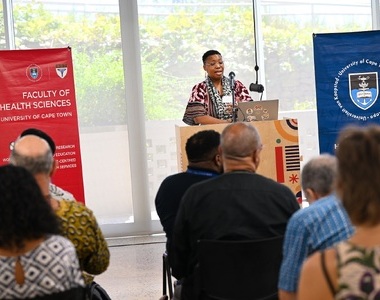Evidence. What evidence?
21 November 2025 | Story Kamva Somdyala. Photos Katherine Rainers. Read time 5 min.
A panel discussion on day two of the Teaching and Learning Conference at the University of Cape Town (UCT) centred around the topic of building an evidence-based culture. The word “data” set the tone on 18 and 19 November as scholars and researchers dissected the theme.
Panellists included staffers from UCT, the University of the Western Cape (UWC) and the University of the Witwatersrand (Wits) to name a few. The conference focused on how data can be created, shared, analysed and leveraged to create equitable educational opportunities and outcomes for all UCT students. The conference was co-hosted with the Data Analytics for Student Success (DASS).
Deputy Vice-Chancellor (DVC) for Teaching and Learning, Professor Brandon Collier-Reed led the discussion: “I’ve noted a couple of themes emerging from the conference; there’s a notion of moving from analytics to action; student and staff voices as evidence; quantitative data being informed by qualitative data; as well as governance, privacy and ethics; and finally, capacity building within the space we are talking about.”
The keynote speaker on day one, Professor Francois Strydom from the University of the Free State, spoke on “data for what?” In turn, Professor Collier-Reed asked the panel to discuss “evidence for what?”
“I don’t think we have a problem with building a culture of evidence-based decision making. We have had over 100 presentations over the last two days that lean heavily on evidence,” said Ashraf Conrad, the director at Institutional Planning at UCT.
“I want to also acknowledge our amazing co-authors and the people with the lived experience of pain.”
Dr Kerrin Begg, deputy dean at the Faculty of Health Sciences, weighed in: “When we put interventions in place, how do we measure and ensure that we have the results that we intended? Part of the work I’ve done in asking for data and using the data is to check whether we are delivering on what we said we are going to deliver on and that is a big part of our responsibility.
“As an institution, we have an evidence-based culture from a research perspective; therefore, can we look at the evidence to say what it is that we should consider doing [with the evidence]; but I’m not sure that we are always good at closing the loop.”
The panel had an engaging audience who probed questions around data education, training for staff, making students understand data collection, as well as the quality of assessments. In other words, there is so much that can be attributed to data, so what?
Associate Professor Shannon Morreira, deputy dean in the Faculty of Humanities, said: “We are facing this artificial intelligence [AI] moment and what is forcing us to do is to think about what we are assessing and what are the learning outcomes that matter.
“I think where we don’t have good frameworks for student voices is in things like course evaluations; we get a lot of qualitative data, but it isn’t used as well as it could be,” said Associate Professor Morreira.
UCT Open Textbook Award
As has been the norm in the past, the UCT Open Textbook Award was presented on the day. The UCT Open Textbook Award has a social justice focus and aims to recognise activities that support the university’s transformation efforts. In line with this approach, the award recognises open textbook development initiatives which address several criteria.
This year the award was presented to Jocelyn Park-Ross and Professor Romy Parker for their work, Understanding Pain: Unravelling the Physiology, Assessment, and Management of Pain through South African Stories. Joining them was Dr Jasper Slingsby for An Introduction to Ecological Forecasting.
“This is really exciting, and I do want to acknowledge Jo as a co-editor. She is the one who made this happen,” a visibly joyous Professor Parker said after the award. “I want to also acknowledge our amazing co-authors and the people with the lived experience of pain, without whom this would not have happened. They shared their stories with us, and we co-wrote this with them.”
Dr Slingsby said: “The textbook is very relevant to the discussion about an evidence-based culture, because the focus is really on forecasting ecological phenomena to help decision-making around environmental issues.”
He added: “It has a bit of everything from how to approach the issue quantitatively, how to bring in the qualitative evidence and historical knowledge in several ways and blending that with existing data.”
 This work is licensed under a Creative Commons Attribution-NoDerivatives 4.0 International License.
This work is licensed under a Creative Commons Attribution-NoDerivatives 4.0 International License.
Please view the republishing articles page for more information.





































































































































































































































































































































































































































































